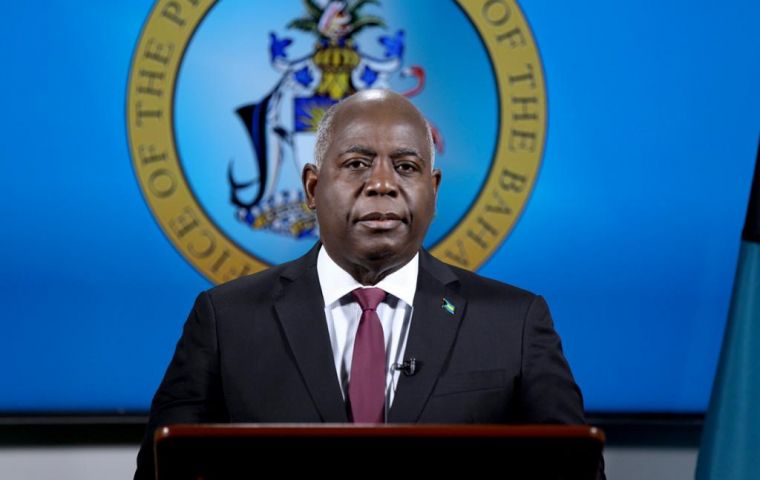NASSAU, Sept 15 (NNN-MERCOPRESS) — Bahamian Prime Minister Philip Davis insisted upon signing the book of condolences over Queen Elizabeth II’s death that the alternative to call a referendum for the people to decide whether or not to admit Charles III as the new sovereign was open.
Davis said that a plan to hold a constitutional referendum for the Bahamas to break with the British Crown and proclaim a republic is “always” on the table.
“The only challenge to us moving to a republic is that, as much as I want to, I cannot do it without” the people’s consent. Davis said. “The Bahamian people would have to say ‘yes’,” he added.
Foreign Minister Fred Mitchell and former Health Minister Renward Wells have already spoken in favor of dropping supported abandoning the monarchy.
“The question and the challenge now is that the new king will have to play the role that his mother played magnificently and the question will be how effective he will be in keeping everything running as it has in the past,” former Prime Minister Perry Christie said.
Belize, Jamaica, Antigua and Barbuda, St. Vincent and the Grenadines, and St. Lucia are the former British colonies that after their independence maintained the British monarch as head of state and in recent months have advocated changing their political status.
Antigua and Barbuda’s Prime Minister Gaston Browne announced last Saturday that his country would go to a referendum to decide whether to remain a monarchy.
Elizabeth II’s death seems to have unrolled a series of movements in the same direction following Barbados’ decision last year to terminate her status as sovereign and move on to becoming a republic.
There are 14 states throughout Central America and the Caribbean that still retain the British monarchy as head of state and might take similar steps in the months to come.
“It does not represent any form of disrespect to the monarch. This is not an act of hostility, nor any difference between Antigua and Barbuda and the monarchy,” Browne said. He added that this referendum would be “a final step in completing the circle of independence” for Antigua and Barbuda to become “a truly sovereign nation.”
Browne, who has confirmed Charles III as the new head of state, Sunday pointed out that the issue was not related to Elizabeth II’s passing, since he had already brought up the possibility earlier this year.
Founded at the end of 1926, the Commonwealth seeks to promote political and economic cooperation although, since the middle of the last century, membership does not imply that the member countries must pay obeisance to the British monarch.
According to Browne, the public consultation would be scheduled for three years from now and is also subject to him being re-elected next year, which seems quite likely given that his party holds 15 of the 17 seats in the House of Representatives.
Joining Antigua and Barbuda, New Zealand Prime Minister Jacinda Ardern has left the door open for yet another departure, certainly a more notorious one if it comes to be. ”I have made my views clear many times. I think (independence) is where New Zealand will be heading in the future. It’s likely to happen in my lifetime, but it shouldn’t be seen as a short-term measure or anything that’s on the agenda in the short term,“ Ardern said.
However, Prime Ministers Anthony Albanese of Australia and Justin Trudeau of Canada, the Commonwealth’s largest countries, do not seem too keen on the idea.
Elizabeth II has always ”respected the self-determination of the Australian people,” Albanese explained.
In Jamaica, nothing was said after the Queen’s death last week, but the issue has been on the table since March this year, while in St. Vincent and the Grenadines, demonstrations against the monarchy have been staged recently.
And all is somehow quiet on the western front of the Bahamas, Belize, Grenada, St. Kitts and Nevis, and St. Lucia, where independence movements are known to exist but have not been revived after Elizabeth’s death. — NNN-MERCOPRESS







